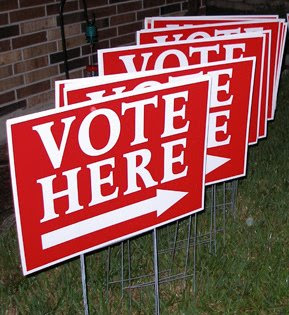
With a very important election here in the USA next Tuesday, I'm getting ready to vote. I know how I'm voting for president, and for some other major ballot issues.
But here in California we often have a large number of ballot issues on a huge range of subjects, many of them having to do with fiscal issues. (Example: Do we want to issue bonds to finance jails, or transit systems, or whatever?) Others involve subjects such as "standards for confining farm animals." This time, we have 12 such propositions at the state level, and more on the local level.
And then there also the candidates in the local elections, such as the County Board of Education - not one that gets a lot of media attention.
The first step in getting organized to vote is making sure I get election day on my calendar, and making sure I know where my polling place is.
But the bigger task is deciding how to vote. Here's how I go about making those decisions:
1. Read the editorials from a range of newspapers. I don't want the simple list of endorsements; I want the editorial where the paper lays out its reasoning. By the time I've read a range of opinions, I'm often set. Editorials I read include those from the San Francisco Chronicle, the San Francisco Bay Guardian, the Los Angeles Times, and the Sacramento Bee.
2. Read (parts of the) voter information guide mailed out by the state: the analysis by the legislative analyst, and the arguments for and against. On the latter, I may not read the whole thing - but I do look to see who's supporting what. Also read the candidate statements in the sample ballot and voter information pamphlet mailed out by the county.
3. Look at SmartVoter for more information about local candidates. (And any candidate that didn't bother to provide information for this League of Women Voters web site has at least one strike against him or her, in my book.) Sometimes I'll follow links from this web site to the sites of the candidates, to learn even more about them.
4. Check the endorsements of groups whose opinion I value, such as some environmental groups.
5. In some elections, attend events where a group of candidates at the local level are speaking.
6. Ignore radio ads and most mailings sent to my house. (I don't have a TV, so ignoring those ads is a snap.)
I'd be interested in hearing how anyone else decides how to vote on the less-well-known candidates and issues.
[photo by lakelandlocal / Chuck Welch]

No comments:
Post a Comment